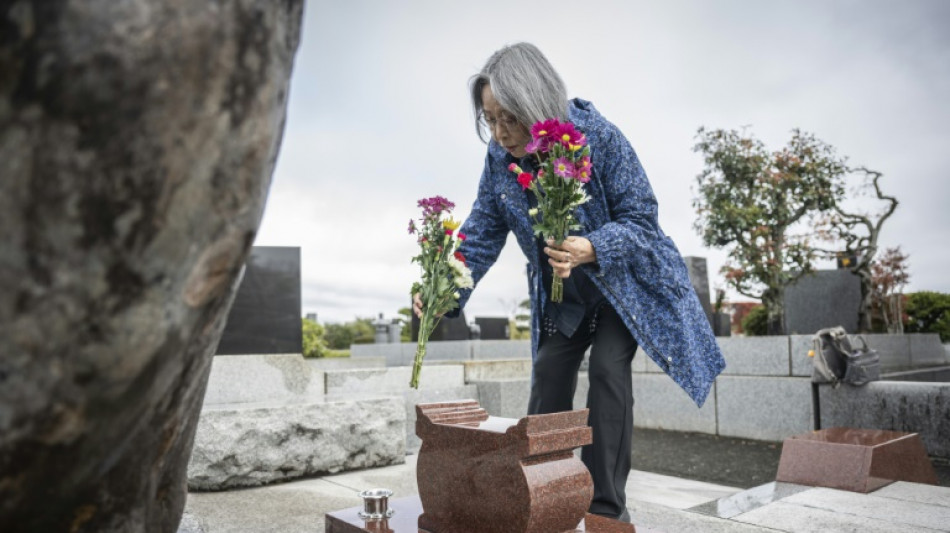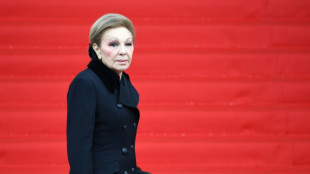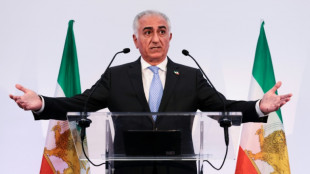
-
 High-speed train collision in Spain kills 39, injures dozens
High-speed train collision in Spain kills 39, injures dozens
-
Gold, silver hit peaks and stocks struggle on new US-EU trade fears

-
 Auger-Aliassime retires in Melbourne heat with cramp
Auger-Aliassime retires in Melbourne heat with cramp
-
Melbourne home hope De Minaur 'not just making up the numbers'

-
 Risking death, Indians mess with the bull at annual festival
Risking death, Indians mess with the bull at annual festival
-
Ghana's mentally ill trapped between prayer and care

-
 UK, France mull social media bans for youth as debate rages
UK, France mull social media bans for youth as debate rages
-
Japan PM to call snap election seeking stronger mandate

-
 Switzerland's Ruegg sprints to second Tour Down Under title
Switzerland's Ruegg sprints to second Tour Down Under title
-
China's Buddha artisans carve out a living from dying trade

-
 Stroking egos key for Arbeloa as Real Madrid host Monaco
Stroking egos key for Arbeloa as Real Madrid host Monaco
-
'I never felt like a world-class coach', says Jurgen Klopp

-
 Ruthless Anisimova races into Australian Open round two
Ruthless Anisimova races into Australian Open round two
-
Australia rest Cummins, Hazlewood, Maxwell for Pakistan T20 series

-
 South Korea, Italy agree to deepen AI, defence cooperation
South Korea, Italy agree to deepen AI, defence cooperation
-
Vietnam begins Communist Party congress to pick leaders

-
 China's 2025 economic growth among slowest in decades
China's 2025 economic growth among slowest in decades
-
Gauff, Medvedev through in Australia as Djokovic begins record Slam quest

-
 Who said what at 2025 Africa Cup of Nations
Who said what at 2025 Africa Cup of Nations
-
Grizzlies win in London as heckler interrupts US anthem

-
 Three-time finalist Medvedev grinds into Australian Open round two
Three-time finalist Medvedev grinds into Australian Open round two
-
Auger-Aliassime retires from Melbourne first round with cramp

-
 Rams fend off Bears comeback as Patriots advance in NFL playoffs
Rams fend off Bears comeback as Patriots advance in NFL playoffs
-
Thousands march in US to back Iranian anti-government protesters

-
 Gotterup charges to Sony Open victory in Hawaii
Gotterup charges to Sony Open victory in Hawaii
-
Gold, silver hit records and stocks fall as Trump fans trade fears

-
 Auger-Aliassime retires injured from Melbourne first round
Auger-Aliassime retires injured from Melbourne first round
-
Gauff through, Auger-Aliassime retires as Djokovic begins record quest

-
 China says economy grew 5% last year, among slowest in decades
China says economy grew 5% last year, among slowest in decades
-
Young star Zheng may have to give back Australian Open prize money

-
 Gauff overcomes wobble in winning start to Melbourne title bid
Gauff overcomes wobble in winning start to Melbourne title bid
-
Harry set for final courtroom battle against UK media

-
 'It wasn't clean': Mother mourns son killed in US Maduro assault
'It wasn't clean': Mother mourns son killed in US Maduro assault
-
Louvre heist probe: What we know

-
 Surging billionaire wealth a political threat, Oxfam warns as Davos opens
Surging billionaire wealth a political threat, Oxfam warns as Davos opens
-
Morocco fans stunned, disappointed as Senegal win Africa title

-
 Senegal fuelled by 'injustice' in AFCON final triumph, says hero Gueye
Senegal fuelled by 'injustice' in AFCON final triumph, says hero Gueye
-
Morocco coach Regragui laments 'shameful' scenes in AFCON final defeat

-
 Maye, Boutte wonder-catch carry Patriots past Texans
Maye, Boutte wonder-catch carry Patriots past Texans
-
Train collision in Spain kills 21, injures dozens

-
 Brazilians Abner, Endrick help Lyon climb to 4th in Ligue 1
Brazilians Abner, Endrick help Lyon climb to 4th in Ligue 1
-
Barca beaten at Real Sociedad as Liga title race tightens

-
 Socialist to face far-right candidate for Portugal's presidency
Socialist to face far-right candidate for Portugal's presidency
-
Senegal stun hosts Morocco to win AFCON title after final walk-off protest

-
 Syria's leader agrees truce with Kurds after govt troops advance
Syria's leader agrees truce with Kurds after govt troops advance
-
Morant shines as Grizzlies top Magic in London

-
 Real Sociedad end Barca winning streak to tighten Liga title race
Real Sociedad end Barca winning streak to tighten Liga title race
-
Senegal stun hosts Morocco to win AFCON title after ugly scenes mar final

-
 AC Milan in touch with Inter thanks to Fullkrug's first Serie A goal
AC Milan in touch with Inter thanks to Fullkrug's first Serie A goal
-
Lyon climb to fourth in Ligue 1 with victory over Brest


Japan's A-bomb survivors: from discrimination to a Nobel
Survivors of the US atomic bombings of Japan will receive the Nobel Peace Prize on Tuesday but, after years of anti-nuclear campaigning and showing the world their scars, they still retain the painful memories of the discrimination they have faced.
After the 1945 US bombings of Hiroshima and Nagasaki led to Japan's surrender and the end of World War II, many people who survived the attacks were shunned by society.
Prejudice related to their exposure to radiation made it hard for them to find jobs and affected their prospects for marriage, leading one small group in Tokyo to build a communal grave where dozens were buried together.
There are currently around 106,800 A-bomb survivors, known as "hibakusha", in Japan, according to the government. Their average age is 85.
One of them is 90-year-old Reiko Yamada, who was 11 and lived in Hiroshima when the United States dropped the first atomic bomb on August 6, 1945, killing around 140,000 people.
That attack, and another three days later on Nagasaki where 74,000 people were killed, inflicted severe injuries and radiation-related illnesses on those who survived.
"People faced extreme discrimination" over their scars and exposure to radiation, Yamada told AFP.
"In the past, people told hibakusha, 'Don't get married' or 'Don't come close. You are infectious'," she said.
"Some people lost their whole family in Hiroshima or Nagasaki, and even though they stayed with relatives, they were stripped of what they used to own and were bullied."
Yamada, who lives in Tokyo, has assisted fellow hibakusha for nearly six decades, travelling worldwide to share her experiences.
"When I visited the homes of hibakusha, some of them would whisper to me: 'You are a hibakusha, right? I don't say anything about it to my children,'" she said.
- Shared grave -
The Peace Prize was won by Nihon Hidankyo, a large grassroots group of A-bomb survivors who campaign for their members' rights and a world free of nuclear weapons.
But the prize came too late for many early campaigners who had spoken out about their trauma and physical wounds, hoping to prevent others from suffering as they had.
Terumi Tanaka, Nihon Hidankyo's 92-year-old co-chair, told reporters recently that it was "sad and frustrating" that "so many people who stood next to me, people who led the movement" were not there to share the honour of the Nobel.
After World War II, young people including hibakusha were drawn to big cities such as Tokyo for work and education.
Many survivors chose to live in relative isolation, finding that Tokyo's dense population allowed them to "hide", said Michiko Murata, 73, who helps run Toyukai, an association of hibakusha in the capital.
"Many people struggled a lot," Murata said, often deciding not to have children because of worries over the effects of radiation.
Some members of Toyukai built a shared grave in western Tokyo in 2005 and Murata helps maintain it.
But as they get older, holding an annual mourning ceremony there has become too difficult and will end next year.
The remains of around 60 people are buried under the large, rocky gravestone.
"We inscribe here with our lives: Never tolerate nuclear bombs," a stone plaque next to the tomb says.
Many remembered there were hibakusha without relatives to give them a proper funeral.
"They lived alone. So after they died, they wanted to be with others, in a place where they can talk about Hiroshima and Nagasaki without fears of discrimination," Murata said.
- Blinding light -
Although Yamada did not experience direct discrimination, her family always kept quiet about what they lived through.
"My family never talked about it, even among ourselves," she said.
On the bright August morning when the bomb was dropped on Hiroshima, she was sitting under the shade of a tree in her school's playground when she saw a gleaming B-29 bomber high in the clear sky.
Then blinding white light flashed. Hot sandy gusts blew her onto the ground.
Clouds gathered. The sky darkened. Black rain containing radioactive material began to shower over her and she suddenly felt cold.
"I didn't know what was happening," said Yamada, whose school was located far enough from ground zero to avoid total destruction.
Thousands of bloody and charred survivors soon filled the area, many of them evacuees from the city centre who died on the streets and lay there until the bodies were cleared.
Yamada later learned that around 2,300 bodies were burned on her school's grounds.
"There was no record of their names. They became 'missing individuals'," she said.
Now, as wars rage worldwide, Yamada said the Nobel has validated the survivors' work.
"I hope to pass on our dream to those who can inherit this, and continue," she said.
F.Fehr--VB



